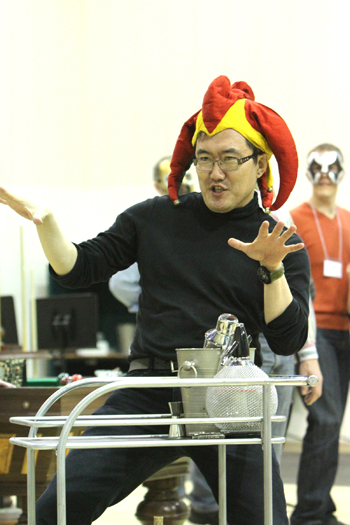
Hyung Yun in rehearsal for his title role in Seattle Opera’s production of “Rigoletto.” Yun will perform in the Jan. 11 and Jan. 24 shows. (Photo by Alan Alabastro)
By Imana Gunawan
Northwest Asian Weekly
When baritone Hyung Yun first got into opera, “Rigoletto,” by Giuseppe Verdi, became an opera he dreamt of performing. Now, Yun’s dreams will be coming true when he plays the part of Rigoletto in Seattle Opera’s production running Jan. 11 through Jan. 25.
Yun, a 45-year-old from Seoul, South Korea, has traveled and performed in theaters across the United States. He is one of the few Asian opera stars in the country. Yun will be performing with the second cast of “Rigoletto” as part of Seattle Opera’s 50th anniversary season. The play was first performed by Seattle Opera 50 years ago, during the company’s first full season. Now, the opera revives its 2004 version, with the play being set in 1930s Mantua, a city in Northern Italy.
The plot is simple, comprising a miserable jester, his virginal daughter, and a dashing playboy duke. Put the three together and drama ensues. When Rigoletto, the jester, tries to avenge the duke for seducing and abandoning his daughter, his plans backfire on him and those he holds dear.
Yun said Rigoletto is one of his favorite roles, because his father, also a baritone opera singer, also performed Rigoletto during his career. Yun has played Rigoletto once before, when he was a student at the Curtis Institute of Music about 20 ago.
“Rigoletto is one of my dream roles — all baritones’ dream roles,” Yun said.
According to Aren Der Hacopian, director of artistic administration at Seattle Opera, the part of the jester Rigoletto requires a certain type of singer.
“It’s all about survival because he’s really pushed, and he’s a jester, so nobody really accepts him,” Der Hacopian said. “It requires some fantastic singing and vocal power and yet a nice ‘color.’ No matter what they’re singing, they have to sing beautifully, even if they’re singing something ugly, something angry, something peaceful — there always has to be beauty — and certain voices stand out for that.”
Der Hacopian said Rigoletto is indeed a dream role, especially for lyric or heavier baritones because the role encompasses a full range of storytelling through voice. It has to be dramatic, heartbreaking, mean, tender, and even tragic.
The two Rigolettos in the Seattle Opera production are Marco Vratogna of La Spezia, Italy, and Yun, who will be performing on the Jan. 11 and 24 shows. Vratogna will be performing the rest.
Vratogna had his Seattle Opera debut in 2012 in the production of Verdi’s “Attila” and has performed as Rigoletto with the New National Theatre in Tokyo. While Vratogna was invited to perform, Yun was recommended for an audition for the part of Rigoletto.
Directly after the audition, Der Hacopian and Speight Jenkins, Seattle Opera general director, made the decision to cast Yun on the spot. Although Yun was more “younger-sounding” in voice for Rigoletto, he “was capable of doing the colors.”
“We look forward to see how he will deliver — it’s an exciting moment,” Der Hacopian said.
Yun said opera is a popular art form in Korea. Even though Yun accounts for one of the few opera stars from Asia, the amount of Asian opera singers has been growing. In fact, Seattle Opera has had some history with casting Asian singers. Der Hacopian said this increase might be due to a shift in mind frame in which younger singers now see opera as a career, not just a hobby. There might also be more channels for younger singers to come to the States or even Europe to immerse themselves in the art form even more.
In addition, with the nation’s growth in diversity, casting directors almost always conduct non-traditional casting — casting a role without considering the actor’s ethnicity — which opens doors for a diverse set of singers, Der Hacopian said.
“Usually, [casting directors] are willing to cross lines and I think most people agree that that opens more opportunity for various people to have more access to roles as well,” he said.
Yun has been preparing for the role and rehearsing with the cast since before December. In addition to performing his dream role with Seattle Opera, he is also looking forward to the audience’s reaction.
“The most rewarding and gratifying feeling comes when I walk off the stage hearing applauding audiences,” Yun said. “This moment is worth everything.” (end)
Imana Gunawan can be reached at info@nwasianweekly.com.



